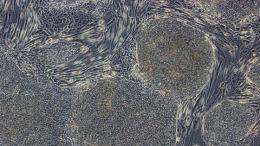April 28, 2011 report
Stem-cell patent battle continues

(PhysOrg.com) -- A group of 13 of the top stem-cell research scientists submitted a letter to the journal Nature this week in response to the European Court of Justice (ECJ) case that could ban all patents involving stem-cell based therapies in Europe.
This battle has been ongoing since 1999 when the international organization Greenpeace put forth a challenge on a patent by Oliver Brustle of the University of Bonn. They argued that his patent for neural precursor cells that were derived from available human embryonic stem cells (hESCs) violated the 1973 European Patent Convention by being immoral. The ECJ is required to reach a decision in the upcoming weeks.
What currently has scientists on edge is a statement made on March 10 by the courts advocate general Yves Bot where he essentially backed the Greenpeace challenge. The courts have a history of backing some 80 percent of the cases in which he has put forth a recommendation.
Bot argues that while hESCs are able to be purified and can be multiplied for researchers indefinitely, they were originally taken from human embryos that were destroyed. Because all patent applications of hESCs are a result of embryo destruction, they violate the European patent directive of 1998 that prohibits the use of embryos for commercial and industrial purposes.
Should the courts decide to block patents involving hESCs it would stop all current research of stem cell treatments in Europe. Scientists like professor Pete Coffey of the London Project to Cure Blindness who is currently working on stem cell research to restore sight argues that there is an ethical need to treat disease and that is what this research is providing. The 13 scientists also are upset with the implication that the research they are conducting is immoral, as the research they are performing has the potential to relieve suffering and treat or cure many conditions and diseases.
Without these patents, the scientists would lose research funding by the pharmaceutical companies who will not be willing to risk their investment without the protection of a patent. If this ban is passed, scientists may have to move their research to another country such as China, Japan, or U.S. where patents are allowed.
More information: 'No' to ban on stem-cell patents, Nature 472, 418 (28 April 2011) doi:10.1038/472418a
Abstract
The advocate-general of the European Court of Justice has recommended the prohibition on ethical grounds of patents involving human embryonic stem cells (Nature 471, 280; 2011). We write to express profound concern over this recommendation, as coordinators of multinational European stem-cell projects, working with both adult and embryonic stem cells. Embryonic stem cells are cell lines, not embryos. They are derived using surplus in vitro fertilized eggs donated after fertility treatment and can be maintained indefinitely. As more than 100 established lines are now supplied through national and international cell banks, concern about commercialization of the human embryo is misplaced.
The letter plus comments from ethicists and scientists is available on eurostemcell.org, along with the opportunity to comment or add a signature at www.eurostemcell.org/stem-cell-patents
© 2010 PhysOrg.com
















